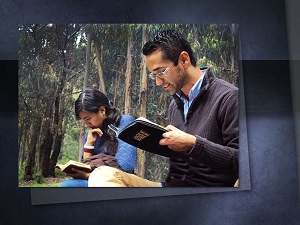
Where their worm dieth not, and the fire is not quenched: an exposition on Christ's words in Mark 9:44

Samuel Smith
23 Jan'19
5
LESSON 4
WHERE THEIR WORM DIETH NOT, AND THE FIRE IS NOT QUENCHED: AN EXPOSITION ON CHRIST'S WORDS IN MARK 9:44
You are welcome to another edition of Insights from God's Word, a Bible study programme that is committed to sharing God's Word by allowing the Bible to speak for itself.In this edition, we continue with our series on The Truth About Hell. In this study, I want us to consider the topic: "Where their worm dieth not, and the fire is not quenched": an exposition on Christ's words in
In our previous study, we discovered that the Bible does not teach that the wicked will be tortured in the fires of hell forever and ever without ever dying. In as much as that study was exhaustive and captured several important points, we did not consider key hell - related phrases such as 'where their worm dieth not', 'the fire that never shall be quenched' and 'unquenchable fire'. The explanation of these hell - related phrases will form the content of this study.
1) SOME BIBLE PASSAGES THAT SEEM TO FURTHER THE TEACHING OF ETERNAL BURNING IN HELL
Many of God's children who further the teaching that the wicked will be tortured on and on in a fire that never goes out do that on the basis of some of the following Bible passages:9:44 WHERE THEIR WORM DIETH NOT, AND THE FIRE IS NOT QUENCHED.
9:45 And if thy foot offend thee, cut it off: it is better for thee to enter halt into life, than having two feet to be cast into hell, INTO THE FIRE THAT NEVER SHALL BE QUENCHED:
9:46 WHERE THEIR WORM DIETH NOT, AND THE FIRE IS NOT QUENCHED.
9:47 And if thine eye offend thee, pluck it out: it is better for thee to enter into the kingdom of God with one eye, than having two eyes to be cast into HELL FIRE:
9:48 WHERE THEIR WORM DIETH NOT, AND THE FIRE IS NOT QUENCHED."
(
i) Consider the background of the key phrases in the passages under consideration;
ii) Compare the texts in question with other similar texts on the subject of hell.
Beloved, when we apply these two important approaches of hermeneutics to the seemingly confusing texts in this study, we come away with an entirely different interpretation from the popular view of hellfire.
2) THE VALLEY OF THE SON OF HINNOM - AN IMPORTANT BACKGROUND
The words 'hell' and 'hell fire' as used in the passage ofAfter the death of Joshua and the elders who outlived him, the Israelites began to worship the gods of the surrounding nations around them (
3) DESECRATION OF THE SHRINE OF MOLECH AT HINNOM
When Josiah became the king of Judah, he led the people to seek after the God of Abraham, Isaac and Jacob. Josiah brought true revival and reformation in Judah (To ensure that the filth in the valley of Hinnom did not lead to the outbreak of an epidemic, a fire was constantly maintained there to ensure that the various impurities were burned up. The constant fire at the valley of Hinnom was later borrowed by the Jews to figuratively denote the punishment of the wicked at the end of the age. Here are some two Old Testament passages that lend credence to this point:
i) "For Tophet is ordained of old; yea, for the king it is prepared; he hath made it deep and large: THE PILE THEREOF IS FIRE AND MUCH WOOD; the breath of the Lord, like a stream of brimstone, doth kindle it" (
ii) And they shall go forth, and look upon the CARCASSES of the men that have transgressed against me: FOR THEIR WORM SHALL NOT DIE, NEITHER SHALL THEIR FIRE BE QUENCHED; and they shall be an abhorring unto all flesh" (
Friends, it is from the imagery of the constant fires at the valley of Hinnom that the prophet Isaiah borrowed the words; "FOR THEIR WORM SHALL NOT DIE, NEITHER SHALL THEIR FIRE BE QUENCHED" (
4) A NEW TESTAMENT APPLICATION OF THE VALLEY OF HINNOM
Beloved, it is from the same imagery of the constant fires at the valley of Hinnom that the forerunner of Christ made the following prophetic statement: "11 I indeed baptize you with water unto repentance, but He who is coming after me is mightier than I, whose sandals I am not worthy to carry. He will baptize you with the Holy Spirit and fire. 12 His winnowing fan is in His hand, and He will thoroughly clean out His threshing floor, and gather His wheat into the barn; BUT HE WILL BURN THE CHAFF WITH UNQUENCHABLE FIRE" (Later on in the New Testament, Christ borrowed this same imagery to describe the fate that awaits the wicked at the end of the world. From
(
Thus friends, the phrase "the fire that never shall be quenched" as used in reference to hell (Gehenna) does not mean that the wicked will burn on and on in the fires of hell without ever dying. It is important to note that just like the 'perpetual fires' that was maintained at the valley of Hinnom to destroy the various impurities that were dumped there, the fires of hell is also described as an 'unquenchable fire'; not because it will not go out, but because its power is so strong that no fire fighters can prevent it from carrying out its work of complete destruction.
5) AN INTERESTING OLD TESTAMENT PARALLELISM ON THE FATE OF THE WICKED
From the prophet Isaiah, we read about the fate of the righteous as well as the wicked at the end of time:66:23 And it shall come to pass, that from one new moon to another, and from one sabbath to another, shall all flesh come to worship before me, saith the LORD.
66:24 And they shall go forth, and look upon the CARCASSES of the men that have transgressed against me: FOR THEIR WORM SHALL NOT DIE, NEITHER SHALL THEIR FIRE BE QUENCHED; and they shall be an abhorring unto all flesh."
(
Question: What is a carcass?
Answer: A carcass is basically a dead body.
Now, from the second part of the same text in
Besides the prophet Isaiah, the prophet Malachi also provides a similar insight in relation to the fate of the righteous as well as the wicked. From
4:2 But unto you that fear my name shall the Sun of righteousness arise with healing in his wings; and ye shall go forth, and grow up as calves of the stall.
4:3 AND YE SHALL TREAD DOWN THE WICKED; FOR THEY SHALL BE ASHES UNDER THE SOLES OF YOUR FEET in the day that I shall do this, saith the LORD of hosts."
(
Thus beloved, it is clear from the passages we have reviewed so far that Christ's words in
6) THE 'UNQUENCHABLE FIRES' OF JERUSALEM
Friends, besides the above clear explanation of hell - related phrases such as 'where their worm dieth not' and 'the fire that never shall be quenched' or 'unquenchable fire', the Scripture provides another clear insight in support of the biblical point we have made above. From the lips of the prophet Jeremiah, the Lord declared unto the people of ancient Israel the following: "But if ye will not hearken unto me to hallow the sabbath day, and not to bear a burden, even entering in at the gates of Jerusalem on the sabbath day; then will I kindle a fire in the gates thereof, and it shall devour the palaces of Jerusalem, AND IT SHALL NOT BE QUENCHED" (Friends, this prophecy of the prophet Jeremiah was literally fulfilled when the Babylonians conquered Jerusalem. Here is the scriptural account of what took place when the soldiers of Babylon entered Jerusalem:
36:21 TO FULFIL THE WORD OF THE LORD BY THE MOUTH OF JEREMIAH, until the land had enjoyed her sabbaths: for as long as she lay desolate she kept sabbath, to fulfil threescore and ten years."
(
7. Friends, from the scriptural passages we have reviewed so far, it is clear that the phrases 'the fire that never shall be quenched' or 'unquenchable fire' as used in reference to hell (Gehenna) does not mean that the wicked will burn on and on in the fires of hell without ever dying. The Scripture forcefully points out that even as the 'unquenchable fires' that was set on the temple and palaces of Jerusalem went out after its work of destruction was done, so will the fires of hell also go out after it has reduced the wicked into ashes (see
Exhortation: Beloved, it is encouraging to learn that the Bible refers to the final punishment of the wicked in the fires of hell as the strange act of God (
In our next study, we will consider the topic: "for I am tormented in this flame": An exposition on the story of the rich man and Lazarus in Luke 16. The Bible Study references for this study are
Stay blessed and keep shining for King Jesus.
Maranatha!
Powered by White Throne Ministries








